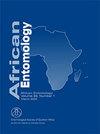一种推定的舌蝇幼虫信息素的田间试验
IF 0.6
4区 农林科学
Q3 ENTOMOLOGY
引用次数: 2
摘要
在实验室条件下,烷烃正戊烷吸引怀孕的雌性采采蝇(Glossina morsitans morsitans Westwood)到潜在的幼虫位置。我们描述了这种化学物质的现场测试,这是第一次对任何假定的采采幼虫信息素进行此类测试。我们在津巴布韦赞比西河流域Rekomitjie研究站附近的11个地点重复了随机分组实验。每个地点由四个人工疣猪洞穴组成,这些洞穴由200升的钢桶建造而成。我们在每个洞里放了六个托盘,里面装满了沙子,上面覆盖着落叶。在实验过程中,居住在该区域的两种采采蝇都进入了这些人工洞穴,并在托盘中沉积了1282个蛹。在13个实验中,以三种不同浓度的正戊烷作为对照进行了测试。我们无法找到任何确凿的证据表明,正戊烷的存在导致morsitans或苍白斑g.m .的幼虫率增加。这一发现与所使用的正戊烷的浓度无关,也不受是否添加水、丙酮或疣猪尿的影响。信息素的任何微小影响都可能被穴居幼虫位置的重要物理特征所掩盖。在幼虫位置添加凋落叶的幼虫率增加的数量级远远大于使用假定的幼虫信息素的幼虫率增加的数量级。本文章由计算机程序翻译,如有差异,请以英文原文为准。
Field Testing of a Putative Larviposition Pheromone for the Tsetse Fly Glossina m. morsitans Westwood
Under laboratory conditions, the alkane hydrocarbon n-pentadecane attracts gravid female tsetse (Glossina morsitans morsitans Westwood) to potential larviposition sites. We describe field-testing of this chemical, which is the first such test for any putative tsetse larviposition pheromone. We replicated randomised block experiments at 11 sites near Rekomitjie Research Station, Zambezi Valley, Zimbabwe. Each site comprised a cluster of four artificial warthog burrows constructed from 200-litre steel drums. We placed six trays, filled with sand and covered with leaf litter, inside each burrow. Both species of tsetse inhabiting this region entered these artificial burrows and deposited 1282 pupae in the trays during the experiments. In 13 experiments, n-pentadecane was tested at three different concentrations against a control. We were unable to find any conclusive evidence that the presence of n-pentadecane resulted in an increased larviposition rate for either G. m. morsitans or G. pallidipes. This finding was independent of the concentration of n-pentadecane used, and was not influenced by the presence or absence of added water, acetone or warthog urine. Any small effect of the pheromone is likely masked by the important physical characteristics of burrow larviposition sites. Order of magnitude increases in larviposition rates when leaf litter was added to larviposition sites were far greater than those due to the use of putative larviposition pheromones.
求助全文
通过发布文献求助,成功后即可免费获取论文全文。
去求助
来源期刊

African Entomology
生物-昆虫学
CiteScore
2.00
自引率
0.00%
发文量
17
审稿时长
6-12 weeks
期刊介绍:
African Entomology (ISSN 1021-3589 – print / 2224-8854 – online) replaced the old Journal of the Entomological Society of Southern Africa in 1993. A single volume consisting of two issues (March and September) is published annually. The journal is indexed in all major abstracting journals
African Entomology is a peer reviewed scientific journal that publishes original research articles and short communications on all aspects of entomology, with an emphasis on the advancement of entomology on the African continent.
 求助内容:
求助内容: 应助结果提醒方式:
应助结果提醒方式:


